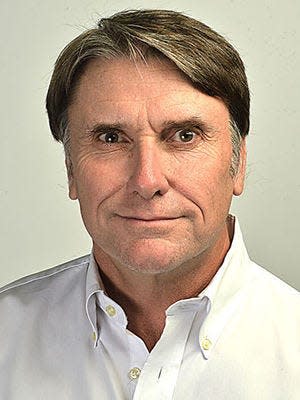Ozempic is making fat a thing of the past. But is that what we want?
As John Lennon sang: Imagine all the people/with 29-inch waists.
Imagine. No more muumuus. Extra-large a quaint remnant of the past. No more middle seats on the airplane with a 250-pounder on either side. Think of the impact on the environment as agriculture scales back on irrigation-dependent cotton production for super-sized garments and pork production plummets.
This is very possible with drugs like Ozempic that helps people effectively shed extra pounds. It has become the trendy drug particularly among the wealthy who have discovered it possesses an almost magical side effect that results in a trim figure. In fact, it’s so effective as a weight-loss drug that no one remembers what Ozempic is actually supposed to be used for.

Although it’s terribly expensive now, at some point in the future it will lose its patent and cheap generic knock-offs will be available to the masses.
That’s great, I guess. Unless you own stock in Oscar Mayer. People will be healthier, more active and more aesthetically in line with societal benchmarks.
Still. There’s something weird about meeting someone at a party and wondering, “Are you thin, or are you Ozempic thin?” And is there a difference? And does it matter?
Technically it doesn’t, I suppose. It’s like the Bible story of the prodigal fat son who comes home after a debauched life of all-you-can-eat buffets at the Golden Corral and is treated to liposuction by his father, much to the consternation of his brother who has remained thin due to a temperate life of sensible exercise and a low-fat diet of fruits and vegetables. It may be good, but that doesn’t mean it’s right.
But in a pill-based society where there’s a drug for everything, I can’t believe there’s going to be much in the way of restraint. If people can’t resist the temptation of the fourth pork chop, why would we think they will decline no-pain weight loss on philosophical grounds?
Already, the drugs are sweeping through affluent neighborhoods.
According to The New York Times, “Last year, about 2.3 percent of people living along a stretch of Manhattan that extended from the Upper East Side down to Gramercy Park were taking Ozempic, Wegovy or Mounjaro — injectable medications belonging to a breakthrough new class of weight loss and diabetes drugs.”
Meanwhile, the diabetics who really need the drugs are getting it in exponentially smaller numbers.
“The running game show of the 10021 zip code is guessing who is on Vitamin O” — that is, Ozempic, Upper East Side native, Jill Kargman told the Times.
I wouldn’t think it would be all that hard. I remember being in a gym one time where one of those step aerobics was about to commence. One of the women showed up with materially different proportions, bosomistically speaking, from the last time class had been held, and was immediately peppered with a hail of piercing questions from her classmates.
She maintained that the radical change was the result of “a couple of new exercises” she’d discovered, but based on the tight-lipped scowls and stoney gazes she received in return, no one was buying it.
As much as we poke fun at fat, I’m not sure a world populated only by thin people is necessarily a positive development. For one thing, I’m not sure the economy could stand the blow if you suddenly had no more use for all the dietary snake oil that probably represents a full percentage of American GDP.
Worse though, who wants a world where everyone is the same shape and size? I submit that we actually need and benefit from people of ample carriage in order to make life more interesting.
Where would we be with no Minnesota Fats, no Lizzo, no Jackie Gleason, no Ignatius J. Reilly?
Is that going to be a world worth living in? Fat chance.
Tim Rowland is a Herald-Mail columnist.
This article originally appeared on The Herald-Mail: Diabetes drug also helps people lose weight; Big MuuMuu worried
